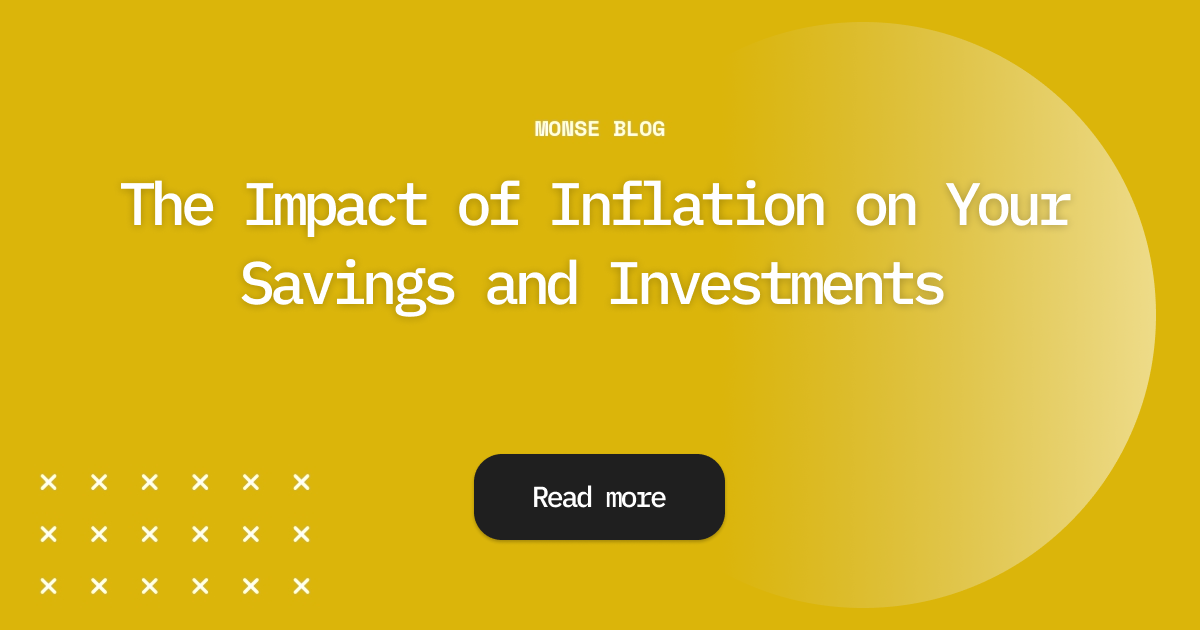The Impact of Inflation on Your Savings and Investments

Inflation has a significant impact on savings and investments as the value of money decreases over time. This article explores the effects of inflation on personal finances and provides strategies for mitigating its impact, such as investing in assets that outpace inflation, using inflation-indexed investments, and diversifying your portfolio.
Inflation is a term that is often thrown around in financial circles, but many people don’t fully understand what it means or how it can affect their personal finances.
Inflation is the rate at which the general level of prices for goods and services is rising, and it has a significant impact on savings and investments. In this article, we’ll explore the impact of inflation on your finances and provide strategies for mitigating its effects.
How inflation affects savings
Inflation can have a significant impact on your savings over time. As the cost of goods and services increases, the value of your money decreases. For example, if you have $100 today and the inflation rate is 3%, in one year, you would need $103 to purchase the same goods and services. This means that if you keep your money in a savings account that earns less than 3% interest, you are actually losing money.
To combat the effects of inflation on your savings, it’s essential to consider inflation when setting savings goals. For example, if you’re saving for a down payment on a house that you plan to purchase in five years, you’ll need to factor in the expected rate of inflation to ensure that you’re saving enough to keep up with rising prices.
How inflation affects investments
Inflation also has a significant impact on investments. As the cost of goods and services increases, the value of your investment returns decreases. For example, if you invest $1,000 in a stock that earns a 5% return, but the inflation rate is 3%, your real return is only 2%.
It’s important to consider the difference between nominal returns (the return on your investment before accounting for inflation) and real returns (the return on your investment after accounting for inflation). Real returns are a more accurate measure of investment performance because they reflect the impact of inflation.
Different types of investments are affected by inflation in different ways. Generally, stocks and real estate tend to outpace inflation over the long term, while bonds and cash investments tend to underperform inflation. However, it’s important to note that all investments carry some level of risk, and past performance is not a guarantee of future results.
Strategies for mitigating the impact of inflation
To mitigate the impact of inflation on your savings and investments, there are several strategies you can use. First, consider investing in assets that outpace inflation, such as stocks, real estate, and commodities. These investments have historically provided returns that outpace inflation over the long term.
Another strategy is to invest in inflation-indexed investments, such as Treasury Inflation-Protected Securities (TIPS). These investments are designed to keep pace with inflation by adjusting their returns based on changes in the Consumer Price Index (CPI).
Diversification and risk management are also essential strategies for mitigating the impact of inflation. By diversifying your portfolio across different asset classes and industries, you can reduce your exposure to inflation risk. Additionally, it’s important to manage risk by investing in a mix of low-risk and high-risk investments that align with your financial goals and risk tolerance.
Inflation has a significant impact on your savings and investments, and it’s essential to consider its effects when making financial decisions. By investing in assets that outpace inflation, using inflation-indexed investments, and diversifying your portfolio, you can mitigate the impact of inflation on your finances. Incorporating inflation into your financial planning can help you achieve your long-term financial goals and protect your finances from the effects of inflation.
Remember, it’s important to do your own research and consult with a financial advisor before making any investment decisions.
Take control of your finances and stay ahead of inflation. Start planning your financial future today.
